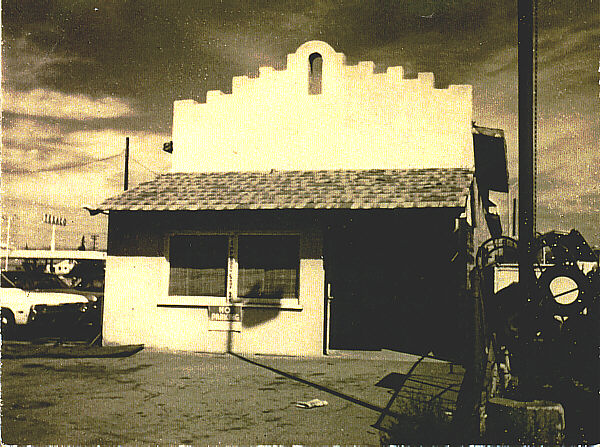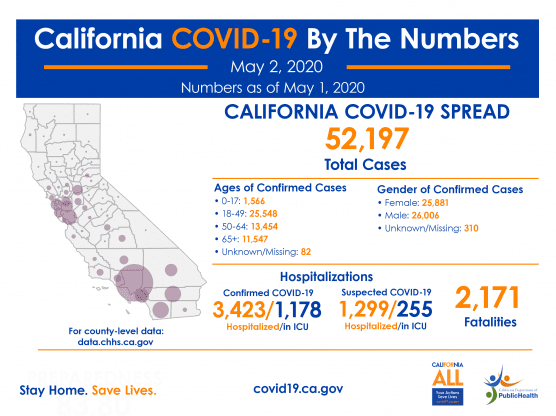[May 2, 2020] – The California Department of Public Health today announced the most recent statistics on COVID-19. California now has 52,197 confirmed cases and 2,171 deaths. Among healthcare workers, local health departments have reported 5,743 confirmed positive cases and 31 deaths statewide.
Testing in California
As testing capacity continues to increase across the state, the California Department of Public Health is working to expand access to COVID-19 testing. Testing should be used for medical evaluation of persons with symptoms of COVID-19 as well as for efforts by public health agencies and essential employers to prevent and control the spread of COVID-19. Individuals prioritized for testing include:
– Symptomatic and asymptomatic healthcare workers, first responders, and other social service employees;
– Symptomatic individuals age 65 and older and symptomatic individuals with chronic medical conditions;
– Individuals who are tested as part of disease control efforts in high-risk settings;
– Asymptomatic residents and employees of congregate living facilities when needed to prevent disease transmission;
– Symptomatic and asymptomatic individuals in essential occupations such as grocery store and food supply workers, utility workers and public employees;
– Other persons with symptoms consistent with COVID-19.

As of May 1, more than 685,048 tests have been conducted in California and reported to the California Department of Public Health. These numbers include data from commercial, private and academic labs, including Quest, LabCorp, Kaiser, University of California and Stanford, and the 25 state and county health labs currently testing.
The Department is now reporting all tests reported in California, rather than the total number of individuals tested. As new laboratories begin to test for COVID-19, some have had delays in reporting to the state. To resolve this issue, and to ensure this data is as complete as possible and reflects the state’s entire testing capacity, the Department is contacting laboratories directly to assess the completeness of reporting and to gather additional testing data if needed.
In addition, laboratories have been working through their backlogs of tests awaiting processing, and the backlog has been reduced. This helps ensure we can meet the additional demand expected from broadening testing guidelines and opening 86 additional sample collection sites across California.
Racial Demographics
The California Department of Public Health is committed to health equity and collecting more detailed racial and ethnic data that will provide additional understanding for determining future action. Health outcomes are affected by forces including structural racism, poverty and the disproportionate prevalence of underlying conditions such as asthma and heart disease among Latinos and African American Californians. Only by looking at the full picture can we understand how to ensure the best outcomes for all Californians.
The differences in health outcomes related to COVID-19 are most stark in COVID-19 deaths. We have nearly complete data on race and ethnicity for COVID-19 deaths, and we are seeing the following trends. Overall, for adults 18 and older, Latinos, African Americans and Native Hawaiians and Pacific Islanders are dying at disproportionately higher levels. The proportion of COVID-19 deaths in African Americans is about double their population representation across all adult age categories. For Native Hawaiians and Pacific Islanders, overall numbers are low, but there is nearly a four-fold difference between the proportion of COVID-19 deaths and their population representation. More males are dying from COVID-19 than females, in line with national trends.
Like this:
Like Loading...
Related





 Tweet This
Tweet This Facebook
Facebook Digg This
Digg This Bookmark
Bookmark Stumble
Stumble RSS
RSS

























REAL NAMES ONLY: All posters must use their real individual or business name. This applies equally to Twitter account holders who use a nickname.
0 Comments
You can be the first one to leave a comment.